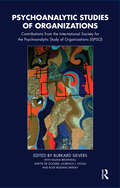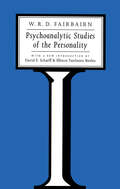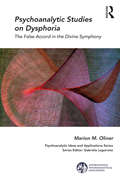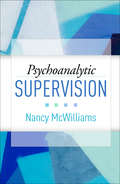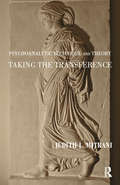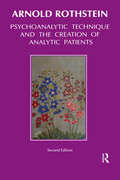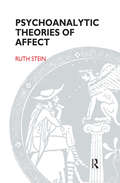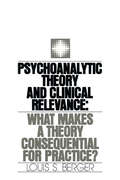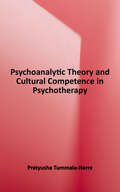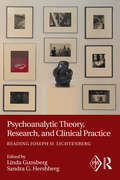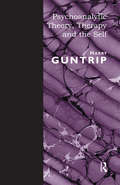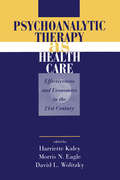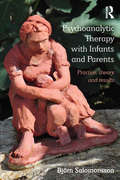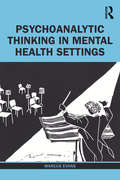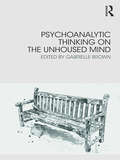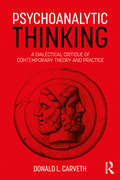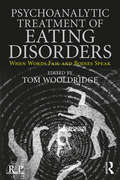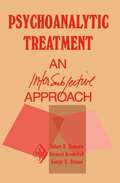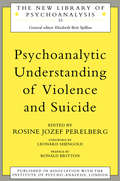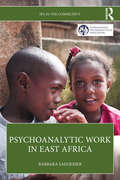- Table View
- List View
Psychoanalytic Studies of Organizations: Contributions from the International Society for the Psychoanalytic Study of Organizations (ISPSO)
by Burkard SieversThis book samples the groundbreaking work that has been developed over the last twenty-five years by psychoanalysts, writers and practitioners associated with the International Society for the Psychoanalytic Study of Organizations (ISPSO). What characterises this collection of original papers is an attempt to look at organizations, groups, teams and organizational role holders using psychoanalytic, systemic and psychodynamic perspectives that collectively eschew superficial, linear, prescriptive and mechanistic views of both the system and the individual within. These papers, delivered as presentations to the Society during the Annual Symposia of the ISPSO from its inception in 1983 to date, collectively form an important commentary on the changing societal dynamics and current preoccupations facing contemporary organizations, their leaders and their workforce. As such, these papers are representative of many that have contributed to, and documented, the development of the thought and praxis from a psychoanalytic perspective and systems thinking over the last quarter of century. Whilst most of these papers have already been published elsewhere, the ISPSO as an organization wished to include them in this volume, recognising their lasting influence and legacy as well as their ongoing impact upon the thinking and the practice of its membership and beyond.
Psychoanalytic Studies of the Personality
by W. R. FairbairnFirst published in 1952, W.R.D. Fairbairn's Psychoanalytic Studies of the Personality re-oriented psychoanalysis by centering human development on the infant's innate need for relationships, describing the process of splitting and the internal dynamic relationship between ego and object. His elegant theory is still a vital framework of psychoanalytic theory and practice, infant research, group relations and family therapy.This classic collection of papers, available for the first time in paperback, has a new introduction by David Scharff and Elinor Fairbairn Birtles which sets Fairbairn's highly original work in context, provides an overview of object relations theory, and traces modern developments, launched by Fairbairn's discoveries.
Psychoanalytic Studies of the Work of Adam Smith: Towards a Theory of Moral Development and Social Relations (Psychoanalytic Explorations)
by Sule Ozler Paul A GabrinettiPsychoanalytic Studies of the Work of Adam Smith blends the rich intellectual heritage of the hermeneutic tradition with the methods and concepts of psychoanalysis, in order to examine the seminal works of Adam Smith. This is the first book on Smith to analyse the works of the groundbreaking moral theorist and founding father of economics from a psychoanalytic perspective, whilst also examining the human capacities and skills that are necessary to put Smith’s ideas into practice. <P><P>Starting with a detailed discussion of the psychological difficulties that afflicted Smith, Özler and Gabrinetti examine the influence that Smith’s life had on the ideas that are found in his major works. The authors explore the sympathetic process in Smith’s The Theory of Moral Sentiments (TMS) from an intersubjectivist perspective and use ideas from developmental psychology to argue that sympathy leads to morality. This book contains a thorough analysis of the defences that are used to create Smith’s moral system in the TMS and explores how Smith’s ideas were precursors to concepts later developed by Freud. The authors show that Smith’s attitude to women was at best ambivalent and consider the reciprocal interaction between markets and morality from an evolutionary psychology perspective. <P><P>Covering an impressive range of topics, this book will appeal to academics and postgraduate students with an interest in psychoanalysis, moral philosophy, history of thought and the social sciences. The book should also be of interest to more advanced undergraduate students.
Psychoanalytic Studies on Dysphoria: The False Accord in the Divine Symphony (The International Psychoanalytical Association Psychoanalytic Ideas and Applications Series)
by Marion M. OlinerPsychoanalytic Studies on Dysphoria: The False Accord in the Divine Symphony depicts the profound dysphoria afflicting certain individuals, and includes the author's own personal experience of this as a German Jewish child during the Holocaust. Marion M. Oliner explores the impact of catastrophic events on the lives of individuals and their descendants from a broadly psychoanalytic perspective. The book focuses on the interplay between the experience and the unconscious meaning attributed to the trauma, and the ways in which patients may feel guilt, and blame themselves for the events and effects of their trauma. Drawing on the work of Freud and Winnicott, and with emphasis on the traumas suffered during the Second World War, Oliner offers new ways of understanding how resistant to treatment such traumas can be, and how the analyst can understand the experiences. The chapters span the evolution undergone in the nearly four decades of practice by the author. The book references a range of works including some taken from the German and French psychoanalytic literature, some never published in English. Taken together they aim at keeping the vitality of psychoanalysis without idealization, while discarding concepts whose essence is static, and therefore unhelpful. Psychoanalytic Studies on Dysphoria will appeal to psychoanalysts as well as other mental health professionals working with self-defeating behavior as a result of trauma.
Psychoanalytic Supervision
by Nancy McWilliamsDrawing on deep reserves of experience and theoretical and research knowledge, Nancy McWilliams presents a fresh perspective on psychodynamic supervision in this highly instructive work. McWilliams examines the role of the supervisor in developing the therapist's clinical skills, giving support, helping to formulate and monitor treatment goals, and providing input on ethical dilemmas. Filled with candid clinical examples, the book addresses both individual and group supervision. Special attention is given to navigating personality dynamics, power imbalances, and various dimensions of diversity in the supervisory dyad. McWilliams guides mentors and mentees alike to optimize this unique relationship as a resource for lifelong professional learning and growth.
Psychoanalytic Technique and Theory: Taking the Transference
by Judith L. MitraniThis volume consists of a series of essays inspired by Freud's paper on Jensen's novel Gradiva - "she who steps along." In the story a young archaeologist, Norbert Hanold, suffers from delusions but is able to unravel the mysteries of his emotional life and mind with the aid of a woman who does not challenge these delusions, but rather "steps along" with Hanold, gradually helping him to disentangle truth from fantasy, through what Freud called "cure by love". Gradiva, originally felt to be the source of Hanold's malady, eventually becomes the agent of its resolution and of his return to health. This extraordinary tale formed the basis for the author's concept of "taking the transference". Through clinical vignettes, various aspects of psychoanalytic technique - useful from the first encounter between patient and analyst and throughout the process of the development of mind to termination - are illustrated in detail.
Psychoanalytic Technique and the Creation of Analytic Patients
by Arnold RothsteinThis is a book on a neglected aspect of psychoanalytic technique that should be read by everyone who hopes to develop a psychoanalytic practice. The author's emphasis on the value of analyzing a prospective patient's motives for avoiding analysis is of utmost importance. An excellent book by a seasoned and gifted analyst.'- Charles Brenner, MD'Psychoanalytic Technique and the Creation of Analytic Patients is clear, practical, and above all courageous. On the central issues from the idea of analyzability, to the objectivity of diagnosis, to attitudes toward fees, Rothstein challenges received wisdom and skewers sacred cows. The result is a book that will help all clinicians - therapist and analyst alike - to work more effectively within the realities of contemporary practice. The author forces us to re-examine many fundamental assumptions, thereby contributing to radical re-evaluation of the nature of the psychoanalytic process itself.' - Jay Greenberg, PhD'In Psychoanalytic Technique and The Creation of Analytic Patients, a successful practicing analyst shares with us many of the secrets of his success.
Psychoanalytic Theories of Affect
by Ruth SteinThis book collates and clarifies psychoanalytic theories on affect, and how they relate to the clinical process. The author outlines and analyses the most important theories on affect, and examines empirical work presented over the past 100 years, exposing the rigidity of some existing notions.
Psychoanalytic Theories of Development: An Integration
by Phyllis Tyson Robert L. TysonThorough review of psychological development starting at infancy going through adulthood with emphasis on major developmental milestones.
Psychoanalytic Theory and Clinical Relevance: What Makes a Theory Consequential for Practice?
by Louis S. BergerIn this provocative contribution to both psychoanalytic theory and the philosophy of science, Louis Berger grapples with the nature of "consequential" theorizing, i.e., theorizing that is relevant to what transpires in clinical practice. By examining analysis as a genre of "state process formalism" - the standard format of scientific theories - Berger demonstrates why contemporary theorizing inevitably fails to explain crucial aspects of practice. His critique, in this respect, pertains both to the formal structure of psychoanalytic explanation and the technical language through which this structure gains expression. The pragmatic recommendations that issue from this critique are illustrated with respect to a number of perennial problem areas besetting analysis and cognate disciplines. In a discussion that encompases theories of affect, issues in family therapy, the nature of first-language acquisition, and the philisophical topics of free will and determinism, Berger shows that certain systems of representation (including ordinary language) can describe the psychological realm adequately, and that such systems necessarily follow modern physics in rejecting naive assumptions about the separability of theory and practice. His proposals culminate in a "nonhierarchical" conception of psychoanalytic theory that assigns a separate status to the clinically pragmatic level of theorizing. In both his critique of contemporary analysis and his reconstructive proposals, Berger fuses into a highly readable argument a fascinating range of insights culled from epistemology, linguistics, physics, logic, computer science, history, and aesthetics. More impressively still, he demonstrates how an investigation of psychoanalytic theory can serve as a vehicle for examining pervasive epistemological issues in both philosophy and the social sciences.
Psychoanalytic Theory and Cultural Competence in Psychotherapy
by Pratyusha Tummala-NarraWhile psychoanalytic scholars often address specific aspects of diversity such as gender, race, immigration, religion, sexual orientation, and social class, the literature lacks a set of core principles to inform and support culturally competent practice. This approachable volume, now available in paperback, responds to that pressing need. Drawing on the contributions of psychoanalytic scholars as well as multicultural and feminist psychologists, Pratyusha Tummala-Narra presents a theoretical framework that reflects the realities of clients' lives and addresses the complex sociocultural issues that influence their psychological health. Psychoanalytic theory proves to be particularly valuable in exploring unconscious processes, recurrent themes, and transference and counter-transference. In examining these questions, the author provides engaging case illustrations from her own clinical practice, as well as findings from her research with youth of immigrant origin.
Psychoanalytic Theory, Research, and Clinical Practice: Reading Joseph D. Lichtenberg (Psychoanalytic Inquiry Book Series)
by Linda Gunsberg Sandra HershbergPsychoanalytic Theory, Research and Clinical Practice: Reading Joseph D. Lichtenberg explores both Lichtenberg’s psychoanalytic theoretical contributions and innovations in clinical technique, and how these have influenced the work of other psychoanalysts and researchers. Lichtenberg’s approach integrates a developmental perspective on the life cycle, self-psychology, attachment theory, and his theory of motivational systems. The commentaries in this volume are divided into several sections. Section One is devoted to informal interviews with Lichtenberg that portray an account of the evolution of psychoanalysis through Lichtenberg’s eyes interwoven with the development of his own psychoanalytic identity. Section Two celebrates the role of friendship within his psychoanalytic circle, and Section Three highlights his leadership role in the development of creative structures: the journal Psychoanalytic Inquiry; The Institute for Contemporary Psychotherapy and Psychoanalysis (ICP&P) and its training programs; and the ongoing Creativity Seminar. Additional sections provide commentary by psychoanalysts and researchers which demonstrate Lichtenberg’s theoretical and clinical impact on his colleagues. Psychoanalytic Theory, Research and Clinical Practice provides an in-depth encounter with a major contributor to the psychoanalytic field. Engagement with the openness, flexibility, and inquiring spirit of Joseph D. Lichtenberg offers respect for and hope in the psychoanalytic process. This book is essential reading for psychoanalysts, mental health professionals, and graduate students interested in how theory, research and technique are creatively integrated by a renowned psychoanalytic clinician and teacher.
Psychoanalytic Theory, Therapy and the Self
by Harry Y. GuntripPsychoanalytic Theory, Therapy and the Self presents, in a readily accessible form, the overall theoretical position adopted by the author in his two earlier books Personality Structure and Human Interaction (1961) and Schizoid Phenomena, Object Relations and the Self (1968). Part One, addressing itself to theoretical issues in psychoanalysis, traces the changes which have occurred in psychodynamic thought since Freud's early conjectures, reflecting the physicality mode of scientific thought in which he had been trained and typified by the theory of instincts have been largely modified or superseded by the contributions of object-relations theory. Part Two, based on a series of seminars devoted to the structure and treatment of the schizoid personality, puts the theoretical issues discussed in Part One into perspective of therapeutic practice.
Psychoanalytic Therapy and the Gay Man
by Jack DrescherDo the conventional insights of depth psychology have anything to offer the gay patient? Can contemporary psychoanalytic theory be used to make sense of gay identities in ways that are helpful rather than hurtful, respectful rather than retraumatizing? In Psychoanalytic Therapy and the Gay Man Jack Drescher addresses these very questions as he outlines a therapeutic approach to issues of sexual identity that is informed by traditional therapeutic goals (such as psychological integration and more authentic living) while still respecting, even honoring, variations in sexual orientation. Drescher's exploration of the subjectivities of gay men in psychoanalytic psychotherapy is more than a long-overdue corrective to the inadequate and often pathologizing tomes of traditional psychoanalytic writers. It is a vitally human testament to the richly varied inner experiences of gay men. Drescher does not assume that sexual orientation is the entire or even major focus of intensive psychotherapy. But he does argue, passionately and convincingly, that issues of sexual identity - which encompass a spectrum of possibilities for any gay man - must be addressed in an atmosphere of honest encounter that allows not only for exploration of conflict and dissociation but also for restitutive confirmation of the patient's right to be himself. Through its abundance of first-person testimony from both clinical and literary sources, Psychoanalytic Therapy and the Gay Man provides the reader with an unforgettable grasp of what it is like to discover that one is gay in our society and then to find the courage and humanity to live with that knowledge. Any mental health professional - regardless of his or her sexual orientation - who wishes to deal therapeutically with gay men will find Drescher's work indispensable. But it will also be compelling reading for anyone seeking psychological insight into gay men's lives and concerns.
Psychoanalytic Therapy as Health Care: Effectiveness and Economics in the 21st Century
by Morris N. Eagle David L. Wolitzky Harriette KaleyIn Psychoanalytic Therapy as Health Care, a timely and trenchant consideration of the clash of values between managed care and psychoanalysis, contributors elaborate a thoughtful defense of the therapeutic necessity and social importance of contemporary psychoanalytic and psychodynamic approaches in the provision of mental health care. Part I begins with the question of where psychoanalytic treatments now stand in relation to health care; contributors offer explanations of the current state of affairs and consider possible directions of future developments. Part II looks directly at the conundrums that have resulted from the attempt to integrate psychotherapy and managed care, with contributors examining the ethical and legal dimensions of confidentiality, privacy, and reporting to third parties. Part III opens to wider consideration of the experiences of psychoanalysts under health care systems throughout the world. Finally, Part IV demonstrates the relevance of contemporary psychoanalytic approaches to a variety of contemporary patient populations, with contributors focusing on the applicability of analytically oriented treatment to AIDS patients, seriously disturbed young adults, and inner-city clinic patients. Collectively, the contributors to Psychoanalytic Therapy as Health Care convincingly refute the claim that psychoanalytically informed therapy is an esoteric treatment suited only to the "worried well." Drawing on a wide range of clinical and empirical evidence, they forcefully argue that contemporary psychoanalytic approaches are applicable to seriously distressed persons in a variety of treatment contexts. Failure to include such long-term therapies within health care delivery systems, they conclude, will deprive many patients of help they need - and help from which they can benefit in enduring ways that far transcend the limited treatment goals of managed care.
Psychoanalytic Therapy in the Hospital Setting (Routledge Library Editions: Group Therapy)
by Paul L. JanssenThough the impetus for psychoanalytic and group-analytic inpatient psychotherapy largely came from Britain, it was in Germany that this work was supported, developed and researched to a greater extent than elsewhere. Originally published in English for the first time in 1994, Paul Janssen describes the different models which had been tried and evaluated and explains his own integrative model in detail, illustrating it with vivid clinical vignettes. The author also shows that inpatient groups are particularly effective in the treatment of severe personality disorders, borderline conditions and psychosomatic illness. This book will still be valuable reading for psychiatrists, psychotherapists, nurses, social workers and anyone working in healthcare today.
Psychoanalytic Therapy with Infants and their Parents: Practice, Theory, and Results
by Björn SalomonssonPsychoanalytic Therapy with Infants and Parents provides a clear guide to clinical psychoanalytic work with distressed babies and unhappy parents, a numerous clinical group so often in need of urgent help. Although psychoanalytic work is primarily verbal, and infants may have limited language, this form of treatment is receiving increased attention among therapists. Björn Salomonsson explores how such work can be possible and benefit infants, how to work with the parents (especially the mother), and how major psychoanalytic concepts such as primal repression, infantile sexuality and transference can be worked with and understood in these therapies. Björn Salomonsson argues that attachment concepts, though important, cannot solely help explain everyday problems with breastfeeding, sleeping, and weaning, or more recalcitrant interaction disorders. He shows how we also need psychoanalytic concepts to better understand, not only such "baby worries", but also adult clients' non-verbal communications and interactions. Throughout, he uses extensive practice-based examples and also refers to his research which provides evidence for the effectiveness of this practice. Psychoanalytic Therapy with Infants and Parents provides a unique perspective on working psychoanalytically with parents and infants. This book will be essential reading for psychoanalysts and therapists working with children as well as adults.
Psychoanalytic Thinking in Mental Health Settings
by Marcus EvansThis book demonstrates the use of psychoanalytic thinking in front-line mental health settings and aims to make an approach to working with emotional and mental disturbance available to a wide range of clinicians within psychiatric and other mental health settings. Rooted in the author’s extensive clinical experiences, the approach explored in this book applies psychoanalytic thinking and discusses this in relation to the mental health conditions regularly encountered in psychiatric settings, such as Schizophrenia, Manic Depression, Psychotic Depression, Anorexia, Deliberate Self Harm, and Personality Disorder. The book therefore provides valuable and practical ways of working with these difficult, complex, and problematic conditions. It further makes sense of the relationships and emotions encountered when working in these settings and introduces possibilities for more effective and rewarding ways of working, including a model of support through supervision, reflective practice, and clinical discussion. Illustrated by clinical examples from more than four decades of experience in the field, this book is ideal for the interested mental health practitioner.
Psychoanalytic Thinking on the Unhoused Mind
by Gabrielle BrownPsychoanalytic Thinking on the Unhoused Mind illuminates the psychological underpinnings of current societal problems: homelessness, mental distress, loneliness and states of societal breakdown and exclusion. Illustrated with a broad range of clinical work as well as thoughts on art and literature, the book brings to life complex tensions between the individual psyche, the group, and wider political and cultural structures. ‘Unhoused’ states of mind are explored in rough sleepers, ex-prisoners, survivors of institutional abuse and family trauma, and people living with personality disorder, addiction, psychosis and dementia. Chapters describe outreach, assessment and long-term psychotherapy, as well as reflective practice with staff teams and care systems, and learning from consultation, supervision and policy development. New therapeutic responses to chronic risk and to resilience are developed from psychoanalytic understandings of difficulties with containment and care. The collection will be of value to psychotherapists and other mental health practitioners, as well as those working in therapeutic, residential and criminal justice settings and outreach services.
Psychoanalytic Thinking: A Dialectical Critique of Contemporary Theory and Practice (Psychological Issues)
by Donald L. CarvethA video of Don Carveth discussing the book and its subject matter can be accessed using the following web URL: https://www.youtube.com/watch?v=yW7tGq0uEtU Since the classical Freudian and ego psychology paradigms lost their position of dominance in the late 1950s, psychoanalysis became a multi-paradigm science with those working in the different frameworks increasingly engaging only with those in the same or related intellectual "silos." Beginning with Freud’s theory of human nature and civilization, Psychoanalytic Thinking: A Dialectical Critique of Contemporary Theory and Practice proceeds to review and critically evaluate a series of major post-Freudian contributions to psychoanalytic thought. In response to the defects, blind spots and biases in Freud’s work, Melanie Klein, Wilfred Bion, Jacques Lacan, Erich Fromm, Donald Winnicott, Heinz Kohut, Heinrich Racker, Ernest Becker amongst others offered useful correctives and innovations that are, nevertheless, themselves in need of remediation for their own forms of one-sidedness. Through Carveth’s comparative exploration, readers will acquire a sense of what is enduringly valuable in these diverse psychoanalytic contributions, as well as exposure to the dialectically deconstructive method of critique that Carveth sees as central to psychoanalytic thinking at its best. Carveth violates the taboo against speaking of the Imaginary, Symbolic and the Real unless one is a Lacanian, or the paranoid-schizoid and depressive positions unless one is a Kleinian, or id, ego, superego, ego-ideal and conscience unless one is a Freudian ego psychologist, and so on. Out of dialogue and mutual critique, psychoanalysis can over time separate the wheat from the chaff, collect the wheat, and approach an ever-evolving synthesis. Psychoanalytic Thinking: A Dialectical Critique of Contemporary Theory and Practice will be of great interest to psychoanalysts and psychoanalytic psychotherapists and, more broadly, to readers in philosophy, social science and critical social theory.
Psychoanalytic Treatment in Adults: A longitudinal study of change (Psychoanalytic Explorations)
by Rosemary Cogan John H. PorcerelliThe outcomes of psychoanalysis, as with other psychotherapies, vary considerably. Psychoanalytic Treatment in Adults examines the results of a longitudinal study of change during psychoanalysis, illuminating the characteristics of patients, analysts and analyses which can help to predict outcomes of treatment. Written by experienced psychologists and psychoanalysts, chapters in the book draw upon sixty case studies to consider how patients with very different analytic outcomes respond at both the beginning and end of their analysis. Psychoanalysts used a clinician report measure, the Shedler-Westen Assessment Procedure, to describe a patient at the beginning of psychoanalysis and every six months until the analysis ended. This allowed the authors to learn about changes over analysis and, in turn, improved treatment planning and practice for the well-being of other patients. Chapters explore five outcomes: a negative therapeutic reaction; attrition when the patient drops out; attrition due to external events; mutual agreement between patient and analyst without maximum benefits; and mutual agreement between patient and analyst with maximum benefits. The findings from these chapters will be of interest to researchers and academics in the fields of psychoanalysis, psychotherapy, psychodynamic therapy, psychoanalytic education, psychiatry and psychology. The results should also help clinicians recognize potential problems early in analytic treatments so that they can work more effectively with patients.
Psychoanalytic Treatment of Eating Disorders: When Words Fail and Bodies Speak (Relational Perspectives Book Series)
by Tom WooldridgePsychoanalytic Treatment of Eating Disorders: When Words Fail and Bodies Speak offers a compilation of some of the most innovative thinking on psychoanalytic approaches to the treatment of eating disorders available today. In its recognition of the multiple meanings of food, weight, and body shape, psychoanalytic thinking is uniquely positioned to illuminate the complexities of these often life-threatening conditions. And while clinicians regularly draw on psychoanalytic ideas in the treatment of eating disorders, many of the unique insights psychoanalysis provides have been neglected in the contemporary literature. This volume brings together some of the most respected clinicians in the field and speaks to the psychoanalytic conceptualization and treatment of eating disorders as well as contemporary issues, including social media, pro-anorexia forums, and larger cultural issues such as advertising, fashion, and even agribusiness. Drawing on new theoretical developments, several chapters propose novel models of treatment, whereas others delve into the complex convergence of culture and psychology in this patient population. Psychoanalytic Treatment of Eating Disorders will be of interest to all psychoanalysts and psychotherapists working with this complex and multi-faceted phenomenon.
Psychoanalytic Treatment: An Intersubjective Approach (Psychoanalytic Inquiry Book Series)
by Robert D. Stolorow George E. Atwood Bernard BrandchaftPsychoanalytic Treatment: An Intersubjective Approach fleshes out the implications for psychoanalytic understanding and treatment of adopting a consistently intersubjective perspective. In the course of the study, the intersubjective viewpoint is demonstrated to illuminate a wide array of clinical phenomena, including transference and resistance, conflict formation, therapeutic action, affective and self development, and borderline and psychotic states. As a consequence, the authors demonstrate that an intersubjective approach greatly facilitates empathic access to the patient's subjective world and, in the same measure, greatly enhances the scope and therapeutic effectiveness of psychoanalysis. Psychoanalytic Treatment is another step in the ongoing development of intersubjectivity theory, as born out in Structures of Subjectivity (1984), Contexts of Being (1992), and Working Intersubjectively (1997), all published by the Analytic Press
Psychoanalytic Understanding of Violence and Suicide (The New Library of Psychoanalysis)
by Rosine Jozef PerelbergAlthough there is a vast literature on aggression, comparatively little has been written on the issue of violence and even fewer clinical discussions have been published on the violent patient. This pioneering book presents a collection of case studies on the intensive psychoanalytic treatment of patients who have committed serious acts of violence against themselves or others. Each detailed clinical account demonstrates the effectiveness of the psychoanalytic treatment and furthers our understanding of the nature of violence. The Psychoanalytic Understanding of Violence and Suicide also contains a comprehensive review of the existing literature on aggression and violence from America, England and France, presenting major themes contained in this literature which will be of interest to all those working with violent and suicidal patients.
Psychoanalytic Work in East Africa (IPA in the Community)
by Barbara SaegesserPsychoanalytic Work in East Africa presents a unique insight into psychoanalytic practice with urban populations in Eastern Africa.Barbara Saegesser describes her psychoanalytic work in different East African locations and in a wide range of contexts. Each chapter considers a particular context, from work in general hospitals and psychiatric hospitals and with children in orphanages, to maternity wards with women who have been subjected to genital mutilation. Saegesser reflects on questions of gender, religion and working across cultures throughout, and considers the benefits of this approach for people who have not previously encountered psychoanalysis.Psychoanalytic Work in East Africa will be of great interest to psychoanalysts and psychoanalytic psychotherapists looking to learn more about working with people in complex, challenging or dangerous situations, across cultures, and in areas where psychoanalysis is not at all known.
